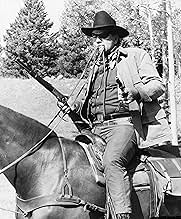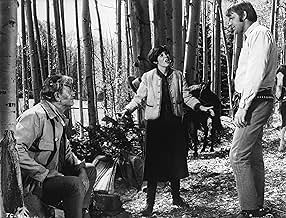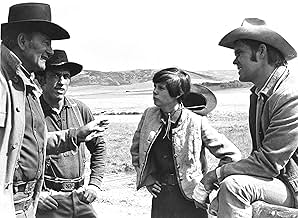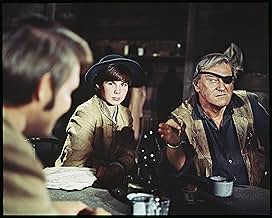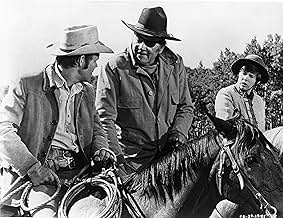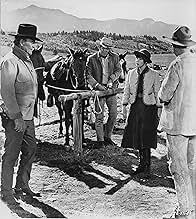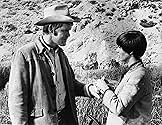Un terco mariscal de Estados Unidos con un problema con el alcohol y un guarda forestal de Texas ayudan a una testaruda adolescente a encontrar al asesino de su padre en territorio indio.Un terco mariscal de Estados Unidos con un problema con el alcohol y un guarda forestal de Texas ayudan a una testaruda adolescente a encontrar al asesino de su padre en territorio indio.Un terco mariscal de Estados Unidos con un problema con el alcohol y un guarda forestal de Texas ayudan a una testaruda adolescente a encontrar al asesino de su padre en territorio indio.
- Dirección
- Guionistas
- Elenco
- Ganó 1 premio Óscar
- 6 premios ganados y 7 nominaciones en total
- Dirección
- Guionistas
- Todo el elenco y el equipo
- Producción, taquilla y más en IMDbPro
Opiniones destacadas
A few directors in the past have tried to present the West in a more refined way, giving importance to the settings and the characterization. Among them is Henry Hathaway's True Grit, an emotionally charged Western about a fearless; one-eyed Marshall named Rooster Cogburn.
The film very stylishly brings to fore the Western countryside, from the scenario at a public hanging to the courtroom drama. In the latter we see some tense and heated exchange of words between the prosecuting lawyer and the Marshall.
The intriguing plot unfolds itself very nicely on the silver screen. The story is simple. Tom Cheney, a cowboy, kills his employer. Maddie (Kim Darby), the headstrong daughter of the employer, vows to take revenge and get Cheney hanged for the murder of her father. For the mission she enlists the support of one Rooster Cogburn (John Wayne). Now this Rooster is the meanest Marshall in the entire territory. Having lost one of his eyes in the war, he is totally fearless in disposition, talks brazenly and has an unconventional sense of humor. Despite his hardened exterior, he is warm and benevolent at heart. This is evident in the conversations between him and Maddie.
The third angle to the mission comes in the form of Sgt Lebeof (Glen Campbell), an enthusiastic Texas Ranger, who is after Cheney for his own motive of collecting ransom money. At first instance, Maddie has reservations about Lebeof. He comes across as an ill mannered, uncivilized guy to her. Convinced that Maddie will not make him a party to the pursuit of Cheney, Lebeof, secretively, unknowing from her, teams up with Rooster. He takes Rooster into confidence and through him manages an entry into the chase for Cheney.
The character of Lebeof is an interesting study. He comes across as an inexperienced person who has a knack for saying something silly all the times. He is rebuked many times for such uttering by both Maddie and Rooster.
Rooster had his own reasons for going after Cheney. It so happened that this Cheney was an accomplice of Lucky' Ned Pepper (Robert Duvall) and Rooster had some unfinished business with Ned. He recently had shot Ned in the lower lip during a confrontation but Ned had escaped. Now this chase provided Rooster with another shot at Ned.
The chase is beautifully picturized. Especially the final confrontation between Ned's gang and Rooster. The action sequence in this scene must be seen to be believed.
The reverberating and sweet music score by Elmer Bernstein forms an integral part of the plot. Glen Campbell has rendered the opening title song in his trademark voice. True Grit is a treat to watch for its believable depiction of the life and times of the West. Henry Hathaway, a specialist director of the crime, western and thriller genre has masterfully directed this flick. Re-uniting with Wayne after Sons of Katie Elder (1965), he has managed to extract the very best from his leading man. John Wayne has essayed the role of his lifetime. It is impossible to imagine anybody but him in the lead role as a tough, uncouth and drunken Marshall. Interestingly, Wayne won his only Oscar for this role in 1970.
In movies, the desire to please as wide an audience as possible seems always to win out, effectively robbing most westerns of the motion picture's essential gambit; the suspension of disbelief. It's very hard to lose oneself in a tale of the late 1800's when the female lead's eye-liner and coiff are pure 1950. Or 1940, 1960, whatever. In True Grit, very little of 1969 is allowed to intrude on this rather simple tale of justice and revenge. This movie is anchored by two very strong themes, shared by all the actors, across most of the scenes.
The first, is language. The dialogue is an absolute delight. Crack open anything by Mark Twain, Henry James or any other late 19th century author, and you will see that people really did speak differently 150 years ago. That the dialogue in 99% of westerns is straight from the time of their filming is a travesty, at best.
Second, is innocence. Not that of any one character however, but the innocence of the human race as a whole. It is probably almost impossible for any of us now, in this day and age, to truly imagine what it must have been like to live back when. But one thing's sure, people were much more naive. There was no such thing as mass-communication, a good percentage of the population didn't read, and newspapers, the only "organized" form of news at the time, were hard pressed to report on anything more than a day's ride from town.
This basic, shared innocence is achingly portrayed by Robert Duvall in two short sentences near the end of the movie when he's caught Mattie and he's attempting to threaten her. Study those two lines, and you'll see that "Lucky" Ned Pepper, the worst villain in the story, really has no idea of what he could possibly do to a slip of a girl. He's totally at a loss. The unspeakable, modern-day atrocities we consume every day with our coffee and bagels are so far from contemplation by Duvall's character, that all he can do is assure her, "I'll do what I have to". It's a priceless moment - frighteningly accurate commentary wrapped in two lines of simple dialogue, delivered with dead-on interpretation.
The only other western I can think of at the moment that delivers with such viscerally historic accuracy is "Unforgiven".
MjM
What True Grit does is succeed on both levels, being both great entertainment and giving John Wayne the acting role of a lifetime in the person of Rooster Cogburn.
Mattie Ross from Darnell and Yell County Arkansas personified by Kim Darby has come to Fort Smith seeking the killer of her father Jeff Corey. Turns out he's also killed a State Senator in Texas so Texas Ranger Glen Campbell informs her. Both of them team up with United States Marshal Rooster Cogburn who resides in Fort Smith with Chin Lee and my favorite movie cat, General Sterling Price.
Corey is now in the outlaw band headed by Robert Duvall at large in the Indian Nation Territory that became Oklahoma. True Grit's plot is the trio's pursuit of Duvall, Corey and the rest of the gang.
But oddly enough True Grit isn't really about plot. It's about the creation of a character. Like Margaret Mitchell who wrote Gone With the Wind with Clark Gable in mind for Rhett Butler, Charles Portis wrote the novel True Grit with only John Wayne in mind as Rooster Cogburn. It must have been one singular delight for Charles Portis to see the Duke flesh out Rooster Cogburn exactly as he conceived him.
Tough old Rooster, likes an occasional drink, isn't above a little larceny, but has one stern moral code about real bad guys. Bring him in dead or alive and make sure you shoot first coming up against them. And he's got quite the colorful past as he relates tales of his younger days to Campbell and Darby on the trail.
In other reviews I've said that John Wayne had one of the great faces for movie closeups. You can see a perfect example of that in that scene with John Fiedler who plays Darby's lawyer J. Noble Daggett. A man who rates high in the legal profession in that area having forced a railroad into bankruptcy.
The camera is facing Fiedler as he's talking to Wayne about his visit with Darby who's life Wayne saved. Wayne's got about a third of his face to the camera. But even with that third, your eyes are focused on the Duke and his reactions and then as the camera slowly pans around to Wayne in full face his reaction shots are hysterical. You don't work with scene stealing character actors like Chill Wills, Walter Brennan, and Gabby Hayes for 30 years without learning something.
John Wayne was up against some stiff competition in 1969 for the Best Actor Oscar. It was his second nomination, the first being for Sands of Iwo Jima. He was facing Richard Burton as Henry VIII in Anne of a Thousand Days and a couple of newcomers named Dustin Hoffman and Jon Voight for Midnight Cowboy. He was certainly the sentimental favorite.
If in no other place in our lives, sentiment does have its place in cinema. It was an honor well deserved, not just for one performance but for a lifetime of achievement in cinema being the player who put more people into movie seats than any other person ever. So many of the Duke's contemporaries like Edward G. Robinson, Errol Flynn, Tyrone Power were never even nominated for an Oscar much less win one.
Because the Motion Picture Academy has deemed this John Wayne's grandest cinematic achievement, it's almost a command to support this fine western and the man who defined the western hero and is still defining it.
Gentle entertainment about a tough-minded , hard-bitten bounty hunter and a fearless bargainer , stubborn adolescent in the Old West starred by the master of the western , an over-the-hill John Wayne , he is magnificent expert in the art of conjuring stylish , here stars this atypical but amusing western with a lot of jokes , distinguished moments , comical attitudes but also violence and action . Wayne deservedly won his best actor Academy Award for this 1960 portrayal of the boozy Marshal . Likable Kim Darby as an obstinate teen is very good , she is extremely quick-witted and confident . The enjoyable story is enhanced for entertaining moments developed among main characters and especially on the relationship between John Wayne and Kim Darby . Impressive final scenes dealing with a spectacular showdown between Rooster Cogburn and chief baddie well played by Robert Duvall. The stellar cast is accompanied with familiar hearted features , some excellent secondary actors as Robert Duvall , Dennis Hooper , Strother Martin , Jeff Corey , Jeremy Slate , Dennis Hooper , among others . Splendid musical score by Elmer Berstein in his usual style as 'The Magnificent seven' , 'The Comancheros' and '4 sons of Katie Elder' . Coloful cinematography by Lucien Ballard , mostly filmed in Natural parks from Montrose, Colorado,Owl Creek Pass ,Ridgway, Colorado, Sherwin Summit, Inyo National Forest and Durango, Mexico . Followed by a sequel titled ¨Rooster Cogburn¨ with Wayne and Katherine Hepburn and a TV movie with Warren Oates and Lisa Pelikan .
Well and professionally realized by Henry Hathaway with strong screen presence by John Wayne , both of whom collaborated in various Westerns , they included ¨Five Card Stud¨ , ¨North to Alaska¨ , ¨Rooster Cogburn¨ and ¨4 sons of Katie Elder¨ . Hathaway himself was only even nominated for an Oscar , but his movies themselves are testimony to his skills to heighten narrative tension and shoot action so exhilarating it made adrenalin run . Henry was a craftsman who had a long career from the 30s with successful films , and especially Westerns , as ¨Brigham Young¨ and ¨Raw Hide¨ . In his 60s Hathaway still got the vigour to make some fiery movies as ¨From Hell to Texas¨, ¨How the West was won¨, ¨Nevada Smith¨, and ¨Shoot out¨ . He was an expert on Western genre as he proved in ¨True grit , Five card stud , Nevada Smith , How the West was won , Rawhide , Brigham Young , Buffalo Stampede, Garden of evil¨ and ¨The sons of Katie Elder¨. Rating : Better than average , nice Western that will appeal to John Wayne fans. Action , interesting plot , top-notch performance and breathtaking last half hour make it fine screen amusement . It's still one of the Duke classics .
¿Sabías que…?
- TriviaStunt double Jim Burk performed the entire scene where Rooster Cogburn charged Ned Pepper's gang on horseback. John Wayne was only seen briefly in close-up, and he was riding on a trailer, not a horse.
- ErroresRooster reports Lucky Ned Pepper had robbed the KATY Flyer, a train that did not start running until 1896, long after the time in which the story is set.
- Citas
[Rooster confronts the four outlaws across the field]
Ned Pepper: What's your intention? Do you think one on four is a dogfall?
Rooster Cogburn: I mean to kill you in one minute, Ned. Or see you hanged in Fort Smith at Judge Parker's convenience. Which'll it be?
Ned Pepper: I call that bold talk for a one-eyed fat man.
Rooster Cogburn: Fill your hand, you son of a bitch!
- Versiones alternativasWhen submitted for a rating from the MPAA in 1969, the film was given an "M". The film was edited and rerated "G". The American VHS version contains the "G" rated cut while the DVD is the uncut "M" version (which would be printed as "PG" since the symbol was changed in the 1970s).
- ConexionesEdited into The Kid Stays in the Picture (2002)
Selecciones populares
- How long is True Grit?Con tecnología de Alexa
Detalles
- Fecha de lanzamiento
- País de origen
- Sitio oficial
- Idioma
- También se conoce como
- True Grit
- Locaciones de filmación
- Productora
- Ver más créditos de la compañía en IMDbPro
Taquilla
- Total en EE. UU. y Canadá
- USD 276,418
- Fin de semana de estreno en EE. UU. y Canadá
- USD 157,788
- 5 may 2019
- Total a nivel mundial
- USD 276,418
Contribuir a esta página



